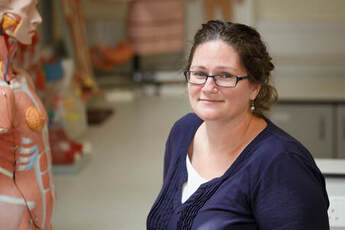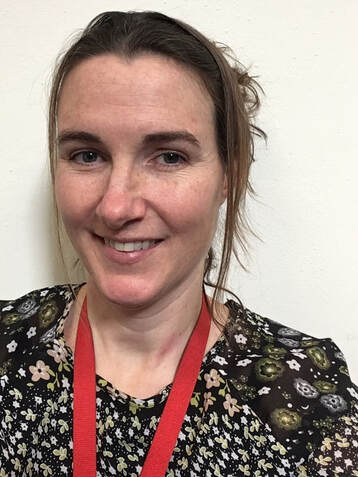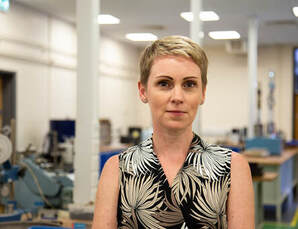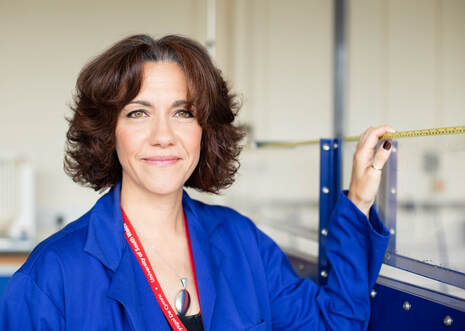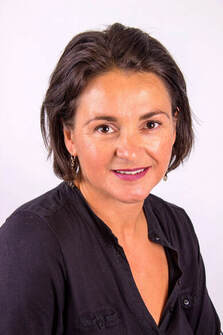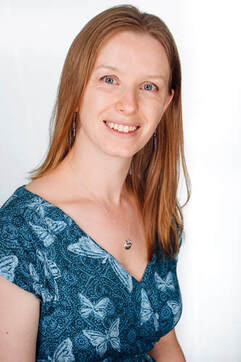In this section we are featuring inspirational women working in science, technology, engineering, maths, medical and health-related sciences in Wales.
If you are a woman working in these areas, we want to share your story.
Email [email protected] and submit either a video or a photo with some text.
If you are a woman working in these areas, we want to share your story.
Email [email protected] and submit either a video or a photo with some text.
WOMEN IN SCIENCE
Dr Tracie McKinney,
Senior Lecturer in Human Biology, University of South Wales
Senior Lecturer in Human Biology, University of South Wales
|
I had a number of female professors in graduate school. They were brilliant, hard-working, and respected amongst students. It took a while for me to notice that none of them had children. I saw this pattern towards the end of my study, when one of these women gained tenure and got pregnant about half an hour later. She had been waiting for years to felt secure enough in her position to start a family. Earning tenure in the US is a long-shot; most scholars never get there, and those who do are rarely under the age of 40. This woman planned to the last detail how she could “have it all” in a system that was not designed for women.
|
The situation for women in STEM is improving, and the UK is decades ahead of the US in how it treats working mothers. Regardless, this was a bit of an eye-opener for me. I always wanted a family, but I wanted to be a scholar, too. Why do these things have to be mutually exclusive? Most of my male profs had kids, and it never slowed them down.
I’m there now, with the coolest kid in town and a secure post as a senior lecturer. Trying to balance motherhood and academia is not easy, though, and my field research has been put on hold. I’ve managed to find a comfortable balance for me, but it is our job to make sure this gets easier for those who come after us.
I’m there now, with the coolest kid in town and a secure post as a senior lecturer. Trying to balance motherhood and academia is not easy, though, and my field research has been put on hold. I’ve managed to find a comfortable balance for me, but it is our job to make sure this gets easier for those who come after us.
Dr Emma Hayhurst,
Senior Lecturer in Biology, University of South Wales
Senior Lecturer in Biology, University of South Wales
|
It is difficult for any parent to juggle the demands of work with the demands of family life. In my case, my desire for a family affected my career even before the children made an appearance.
I was 30, coming to the end of my first postdoctoral position and trying to work out where to go next. I applied for, and was offered, two jobs. One was a three-year position as a Research Associate with the London School of Tropical Medicine and Hygiene, working at their Medical Research Council centre in Gambia. The other was my current position as a Senior Lecturer at the University of South Wales. It was a difficult decision, and I agonised over it. South Wales won and, although I felt a pang about turning my back slightly on a pure research career, I moved happily to Wales and was promptly thrown in at the deep end, teaching students. I survived and it turns out that I love teaching and am quite good at it too, which was a relief. |
Seven and a half years and two children later I know I made the right decision, but my research has suffered. Not just because of the heavy teaching load we have here at the University, but also because I have gone part-time, and taken almost two years off for maternity leave.
The world of academia and research is a tough one to remain in at the best of times, but never more so than if you are a parent. Not only do many parents want to work part time, but you also take time off for your family, are less willing to move them around the country, and less able to stay in the lab until midnight every night. The fast-paced world of research moves quickly. You feel left behind and you lose confidence. In my case, I convinced myself that I was happy being a teacher. I am lucky, because I had a permanent position before I started my family. I have many friends from my post-doc days who left academia altogether once their children arrived. For example, one became a part-time teaching assistant in a school instead. They just could not make it work for them. They were all women. We should mourn the loss of these talented researchers, and do everything we can to make research and family life compatible.
The world of academia and research is a tough one to remain in at the best of times, but never more so than if you are a parent. Not only do many parents want to work part time, but you also take time off for your family, are less willing to move them around the country, and less able to stay in the lab until midnight every night. The fast-paced world of research moves quickly. You feel left behind and you lose confidence. In my case, I convinced myself that I was happy being a teacher. I am lucky, because I had a permanent position before I started my family. I have many friends from my post-doc days who left academia altogether once their children arrived. For example, one became a part-time teaching assistant in a school instead. They just could not make it work for them. They were all women. We should mourn the loss of these talented researchers, and do everything we can to make research and family life compatible.
WOMEN IN Technology
Clare Johnson,
Head of Cyber Security, University of South Wales
Head of Cyber Security, University of South Wales
WOMEN IN ENGINEERING
Rhian Kerton,
Head of Learning, Teaching and Student Experience, University of South Wales
Head of Learning, Teaching and Student Experience, University of South Wales
|
My daughters are very able in maths and have always had fantastic additional support from their primary school to ensure that they are challenged. I remember my older daughter coming home from primary school one day to tell me that her teacher could no longer stretch her in maths so they were planning to bring in someone external once a week with higher maths skills. Fantastic, I thought. On chatting about this some more though it was clear that the message she had actually understood was that her female maths teacher wasn’t very good at sums so they were going to bring in a man. And this is despite having an engineer for a mother!
|
Having been into a number of schools as a STEM ambassador it is so clear that the message needs to get out to the next generation when they are very young. In my personal career journey, I have never experienced any negative gender bias. What I have seen is that it’s more about not enough women wanting STEM careers than women wanting them and being told they don’t make the grade.
Strong female role models are key, seeing a successful woman in STEM could make all the difference to young girls and women wondering whether they have what it takes. Having an inspiring mentor will encourage women to believe ‘that could be me’.
Strong female role models are key, seeing a successful woman in STEM could make all the difference to young girls and women wondering whether they have what it takes. Having an inspiring mentor will encourage women to believe ‘that could be me’.
Dr Luan Al-Haddad,
Lecturer in Civil Engineering Lecturer, University of South Wales
Lecturer in Civil Engineering Lecturer, University of South Wales
|
My fascination with science and construction was evident at an early age. As a child, I spent most of my time designing and building, using any tools I could borrow from my dads shed. I had always had a passion for taking things apart to analyse how they worked and then putting them back together – not always in the right order! I enjoyed maths and science as a child, despite the fact that it never came particularly easy to me, but undertaking a degree in Civil Engineering and Mathematics made me realise I could visualise mathematics in this very applied field. This I found furthered my passion and understanding where I could suddenly see maths in action.
|
It was when I started my PhD and began teaching that I really started to understand how mathematics and science fit into the real world.
My PhD was based on Artificial Neural Networks and their use in identifying and classifying based on morphological characteristics. Despite the biological application, the basis of the networks were computerised mathematical algorithms and I was later employed in a forensic field to assess how these could be used in drugs analysis.
I spent ten years as a scientific research manager and for the last two of those years I returned part time to my passion of applied mathematics in the field of Water Engineering. For the last ten years I have been lecturing applied mathematics topics in the field of Civil Engineering with most of my focus being in Hydraulics and Hydrology. I have also spent five years as a placement tutor for students wishing to undertake an industrial placement year during their degree. It is reassuring to see more women entering into this career and undertaking senior management roles in the field of engineering.
Although this field does not yet have a balance of male and female engineers, I have never felt disadvantaged or treated differently as a woman, particularly as it has been my privilege to meet and work with some incredible female trail blazers in the STEM subjects areas!
My PhD was based on Artificial Neural Networks and their use in identifying and classifying based on morphological characteristics. Despite the biological application, the basis of the networks were computerised mathematical algorithms and I was later employed in a forensic field to assess how these could be used in drugs analysis.
I spent ten years as a scientific research manager and for the last two of those years I returned part time to my passion of applied mathematics in the field of Water Engineering. For the last ten years I have been lecturing applied mathematics topics in the field of Civil Engineering with most of my focus being in Hydraulics and Hydrology. I have also spent five years as a placement tutor for students wishing to undertake an industrial placement year during their degree. It is reassuring to see more women entering into this career and undertaking senior management roles in the field of engineering.
Although this field does not yet have a balance of male and female engineers, I have never felt disadvantaged or treated differently as a woman, particularly as it has been my privilege to meet and work with some incredible female trail blazers in the STEM subjects areas!
Professor Karen M Holford,
Deputy Vice Chancellor and Professor of Engineering, Cardiff University
Deputy Vice Chancellor and Professor of Engineering, Cardiff University
Jacqui Murray is the Deputy Challenge Director of the UK Government’s £274 Million Faraday Battery Challenge - making the UK the go-to place for researching, developing, prototyping and manufacturing batteries for Electric Vehicles. It is the biggest challenge in the Industrial Strategy.
|
I used to tell people I was an engineer. I found it uncomfortable to be described as a woman engineer – it felt like it singled me out away from my team.
That all changed one day in London in 2014. I went to a Women’s Engineering Society Conference on Energy. I must admit, that at that time, I wasn’t looking forward to being in a room with 250 women engineers. I walked into a diverse, competent, inspiring bunch of people. I remember thinking in the middle of the first break – what if being a woman engineer was an advantage? What if being myself, the extrovert, emotional, passionate and sensitive woman could be something that made me a better engineer and someone who was easier to work with? And get better results? Perhaps stupidly, I realised all the things I had been agreeing with on Coaching and Emotional Intelligence training, I hadn’t really been embracing for myself! |
By the end of the day, I had signed up as a STEM ambassador to and pledged to be the forty-something woman that the twenty-something year old me needed.
Ever since, I tell my story in equality, diversity and inclusion (EDI), focussing on the positive performance of a diverse team and the leadership that inclusion requires. I tell engineers to run the numbers provided by the Royal Academy of Engineering and McKinsey and share tools from these courses that I have found most useful.
My current Faraday Battery Challenge team is high performing, high profile, fun and diverse. We all speak about inclusion and always prioritise people. I have stayed true to my original pledge, aiming to give others tools to build confidence and conflict competence.
I am proud to claim that since that date I have :
And I continue to speak at events about how you can leverage emotional intelligence for success, recently at Williams and McLaren – both important actors in batteries for electric vehicles and Formula 1 teams I have supported since I was 15 and why decided to be an engineer. Just sometimes Karma rocks.
Ever since, I tell my story in equality, diversity and inclusion (EDI), focussing on the positive performance of a diverse team and the leadership that inclusion requires. I tell engineers to run the numbers provided by the Royal Academy of Engineering and McKinsey and share tools from these courses that I have found most useful.
My current Faraday Battery Challenge team is high performing, high profile, fun and diverse. We all speak about inclusion and always prioritise people. I have stayed true to my original pledge, aiming to give others tools to build confidence and conflict competence.
I am proud to claim that since that date I have :
- A Member of the Wales WISTEM board,
- Chair of the STEM Women in Welsh Industry subgroup
- Encouraged two UK organisations adopting enhanced paternity leave
- Been part of setting up a Gender Equality Network,
- Helped my Primary School become recognised by Estyn as Best Practice
- Co-ordinated a Foreign Office UK-US STEM The Gap event
- Committee member and inspirational speaker at of the Sandhurst STEM Careers Event for 2000 teens in September 2019.
- Been a role model for the UK Electric Vehicles Industry while delivering a high performing and transformational programme on the road to zero in the UK
And I continue to speak at events about how you can leverage emotional intelligence for success, recently at Williams and McLaren – both important actors in batteries for electric vehicles and Formula 1 teams I have supported since I was 15 and why decided to be an engineer. Just sometimes Karma rocks.
WOMEN IN MATHS
Dr Vicki Brown Lecturer in Mathematics, University of South Wales
|
I have always been drawn to maths and problem-solving, ever since I can remember, and my parents encouraged my interest in the subject. My mum is a maths teacher and I attended a single-sex school so, until I left school, I was not really aware of the under-representation of women in STEM. Once I got to university though, I started to realise that there was a definite gender imbalance. None of my lecturers for my undergraduate maths degree were women, and fewer women were enrolled on the maths degree than men, particularly as I progressed through my degree. This observation was really brought home to me when, during my PhD, I attended a ‘Women in Maths’ day at the London Mathematical Society (the fact that there was a ‘Women in maths’ Day was a good indicator of gender disparity in the subject!). There, someone gave a talk where they presented the percentages of women in maths at different stages of academia. By the time you were looking at professors, they showed that only around 3% of maths professors were female (at that point in time). I couldn’t believe that number was so small!
|
Since then, I have done my best to be visible as a woman working in STEM and encouraging girls to engage with STEM subjects. It is so important to address the gender disparity in STEM, as I believe a truly representative workforce, bringing different ideas and viewpoints (based in the different experiences people have) together, can only make STEM stronger.
WOMEN IN Medical and Health Sciences
Sophie Jones,
Trainee Clinical Scientist, Public Health Wales
Trainee Clinical Scientist, Public Health Wales
Lisa Chichester,
South East Wales Regional Laboratory Manager for UHW and UHL Microbiology, Public Health Wales
South East Wales Regional Laboratory Manager for UHW and UHL Microbiology, Public Health Wales
Kate Baldwin,
Specialist Biomedical Scientist currently locum BMS in UHW Bacteriology, Public Health Wales
Specialist Biomedical Scientist currently locum BMS in UHW Bacteriology, Public Health Wales

